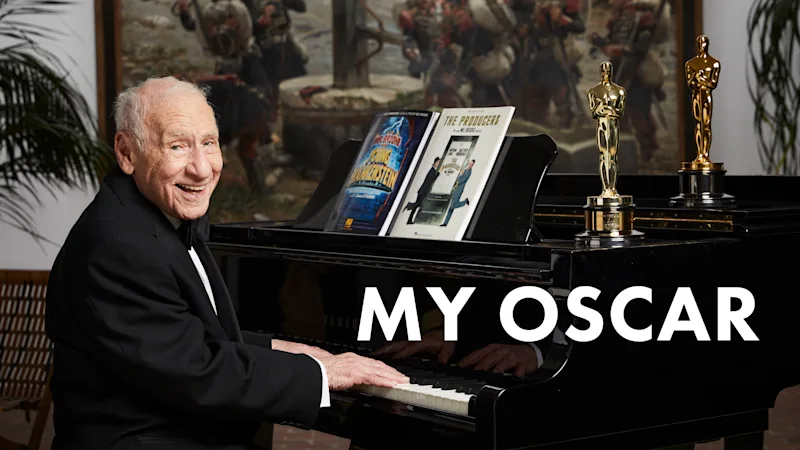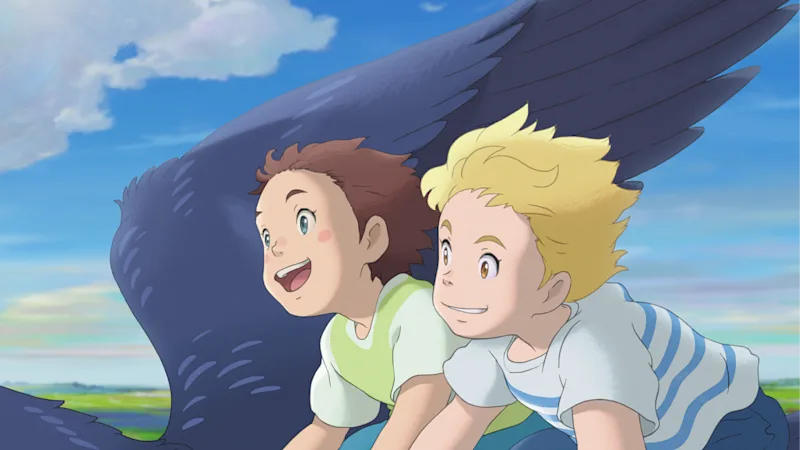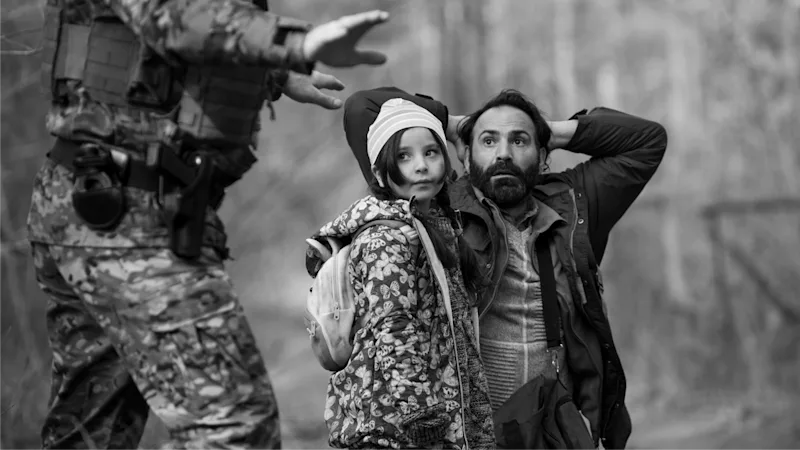Anatomy of a Fall is not a straightforward film. Although it is structured like a traditional courtroom thriller, the French drama is as much an exploration of the ugly truths of life and the complexities of marriage as it is a whodunit about whether or not a woman killed her husband. It wouldn't be an easy film for anyone to put together. Fortunately for film editor Laurent Sénéchal, he has a nearly 15 year history working with Justine Triet, the director of Anatomy of a Fall.
The two first collaborated on Triet's 2010 documentary Des ombres dans la maison, and in the years since, Sénéchal has edited her narrative features In Bed with Victoria (2016), Sibyl (2019), and Anatomy of a Fall. He has also collaborated with Triet's co-writer, the filmmaker Arthur Harari, on five films.
"Our familiarity with each other was really helpful because the movie was very demanding. We really had to try to make each scene as great as every other," explains the editor. "Knowing each other as well as we do made everything faster. Justine used to say that my back could talk to her, because even if we weren't talking during one specific moment, she'd still know what I thought about whatever take or cut we were working on just through my body language."
Anatomy of a Fall centers on a successful writer, Sandra (Best Actress in a Leading Role nominee Sandra Hüller), who is forced to prove her innocence after her husband dies in a mysterious fall. The only potential witness is her visually-impaired 11-year-old son. The film must balance the trial elements with a probing character study of an unknowable lead. "At one point, the first act had to be redesigned a little," Sénéchal reveals. "We never felt lost, though."
At the 96th Oscars, Anatomy of a Fall received five total nominations, including Best Picture, Best Directing, Best Original Screenplay, and Best Film Editing; it is Sénéchal's first Oscar nomination. The recognition comes nine months after Anatomy of a Fall won the Palme d'Or at the 2023 Cannes Film Festival.
"My friends have started to ask me, 'Has the plane landed? Have you come down yet? Are your feet back on Earth?'" Sénéchal tells A.frame. "I just keep telling them, 'I didn't realize I ever even took off!'"

A.frame: Anatomy of a Fall isn't like any other film that you and Justine have made together. What was it like to collaborate with her on a movie that is so radically different from your previous efforts?
Justine is a very intuitive director. In the beginning, she usually only pays attention to the acting. Afterward, she has all these great ideas, but she doesn't behave like an academic director when she starts working on a film. She's not focusing on trying to improve the craft or anything like that; she wants every day to be fun. But it was hard to do that with this movie, because we're talking about the nature of truth and there's a very demanding trial at the center of it! We had to find a way to not be too tight and locked-in with the film's story, so that Justin could still go into it with this attitude and spirit of creation that she has.
At the same time, we had to respect the reality of the film's trial. There's an order to it that has to be respected, and sometimes that was really hard. Sometimes, we'd ask Justine's partner and co-writer, Arthur Harari, for his insight into what we were doing, and I'm really grateful to him for his help. Sometimes, the conversations between Justine and Arthur were difficult, because they're very different artists. She didn't want him to turn Anatomy of a Fall into his movie, and he didn't, but his input was great and really useful. I came up with so many ideas just from them arguing with each other about what we were supposed to do. [Laughs] It was a great experience.
The film is not short, but it isn't slow, either. Editorially, how challenging was it to maintain the film's pace across 152 minutes?
It was a challenge, of course, but it's only work, you know? It was 38 weeks of editing and screenings. We didn't do many screenings with other people or public audiences, but we put on a lot of screenings for us, even just of certain sections of the movie. It was really useful to constantly remind ourselves where we were in the film's story and where we were going, because small details could derail the entire movie. The character of Sandra could become completely manipulative or completely innocent, and we could lose the ambiguity of her character and the story if we didn't find the right balance. The ambiguity is really what we had to maintain. It was really hard to create the right level of empathy for Sandra. But thanks to Sandra Hüller, who is such an amazing actress, we were able to find this strange zone between empathy and doubt when it came to her character.


The film never tells the audience how they're supposed to feel about Sandra. What did you and Justine do editorially to make sure that at no point were you ever painting her one way or the other?
We were always talking about that, because it was hard to look at the film with fresh eyes. It was always a conversation of, "Okay, what we've made is good, but are we sure that we haven't made it possible for her to just be painted as a tricky, scheming woman?" That was really hard to do, but with time, we managed to do it. I think what's important is that, while we certainly exchanged some words about Sandra's portrayal in the film, we never looked at it as a clever game to play with the audience. If you've seen every movie of Justine's that I've edited, you'll understand me when I say that Justine is never trying to push ideas onto the audience. Even if she's doing a comedy, she brings the same approach. When we made In Bed with Victoria together, it was the same thing.
In Anatomy of a Fall, it's all about a trial, so the audience becomes part of the jury judging Sandra, but Justine doesn't see it as some narrative game to play. She sees life the same way that the film does. Life is complex, and you never really know what your deepest feelings are or what the feelings of those around you are. Justine wants to stand in front of the full complexity of life. She wants to ask, "What is a family? What is love? What is truth?" What she doesn't want is to give us a lesson on any of those things. She's not a preacher, and she doesn't see herself that way.
Similarly, the film never feels like it's drifting too far away from Sandra's perspective. What did you do to ensure that it never did?
The film starts off as a kind of traditional thriller, so it'd be easy to make Sandra seem at first like a Hitchcockian character. She could be a blonde-haired, strange woman, where we never know what she's going to do next. But in fact, the true love that Justine has for Sandra Hüller and for her character in the movie led us to treat her and Milo Machado-Graner, who plays Sandra's son, as if they were in a John Cassavetes movie. We're with them. We're not looking at them and using them to tell a story. It's not an experiment where they're insects that we're using for scientific purposes. They're human beings, and we want the audience to feel like they're in a very endearing relationship with them. At the same time, there are these doubts about Sandra's character, and they're growing like a disease throughout the film and affecting her son, Daniel, who has to grow up and become himself. It was all about embracing humanity and ambiguity.
You've mentioned the strength of Sandra's performance a couple times. When you have a performance as commanding as the one she gives, how does that influence your work in the edit?
I have never, ever edited an actress like Sandra. There have been actors I like and who are great, but Sandra has something really special. She performs with every part of her body — even in very wide shots. When she meets her lawyer, for example, they're very far away from the camera at first, and then we cut to a closer shot where she's walking and talking in front of him. Even if the camera is on the other actor or it's far away, though, Sandra is never being lazy. Every part of her is telling the truth. She is true. The first and second takes of each scene were always so nice that I would say that it was Christmas every day in the editing room. When you're cutting her takes, you have so many options. Sometimes, she would accelerate her performance and try different modulations and variations of what she'd done previously, but she was already always amazing in her first take. It was never a problem cutting her performance. We could always work with what she'd given us in each scene.

Congratulations on your first Oscar nomination. What did it mean to you to be recognized in that way?
It's so beyond any secret dream I've ever had. I never thought of that as part of the skyline of my future. I'm very meticulous, and when I'm working, I'm editing French auteur movies. When Anatomy of a Fall won the Palme d'Or at Cannes last year, that was amazing. But I always thought the good wave that would come from that would end sometime around December 2023. When I got this Oscar nomination and the film got five total, that was so unexpected! I can't really process all this information. It's so huge. Even while I'm talking to you today, I'm just trying to have fun with it all. I don't think I quite comprehend everything that's happened yet.
As a film editor, I imagine it must feel particularly special to be nominated alongside a legend in the field like Killers of the Flower Moon editor Thelma Schoonmaker.
It's so amazing. You're right — it's not only the nomination, but seeing your name alongside people like Thelma Schoonmaker is really cool. If you watch every movie she's ever edited, that's its own form of film school. It's funny, because when I'm in an editing room, I'm often saying, "Think about Raging Bull." Sometimes the director, especially if they're a young filmmaker, doesn't want to try weird things or weird editing tricks. But you have to be brave and get over the idea that it won't work. Editing is an artisanal thing, and so when I'd want to try something, I'd say, "Think about Raging Bull, because Raging Bull is made with real guts."
To be nominated alongside editors like Thelma Schoonmaker is a real honor, and the same goes for Jennifer Lame. Her work on films like Manchester by the Sea, Marriage Story, and Oppenheimer has made her as huge of a figure in my mind as Thelma Schoonmaker. She's becoming a new legend, you know? And when I realized that Kevin Tent is Alexander Payne's editor, I was like, "These people really are all great at what they do!" I don't know what I'm going to do when I'm around them, but it's great company to be in.
By Alex Welch
A.frame, the digital magazine of the Academy, is excited to celebrate and honor the nominees of the 96th Oscars across several branches by spotlighting their nominated films, craftsmanship, and personal stories. For more on this year's nominees, take a look at our Oscars hub.
Editor's Note: For parity, A.frame reached out to every nominee in the Best Film Editing category for an interview.
RELATED CONTENT:
'Anatomy of a Fall' Editor Laurent Sénéchal's Top 5
Sandra Hüller Wants to Hear All of Your Theories About 'Anatomy of a Fall' (Exclusive)
'Anatomy of a Fall' Director Justine Triet Opens Up About Her Most Intimate Film Yet (Exclusive)







